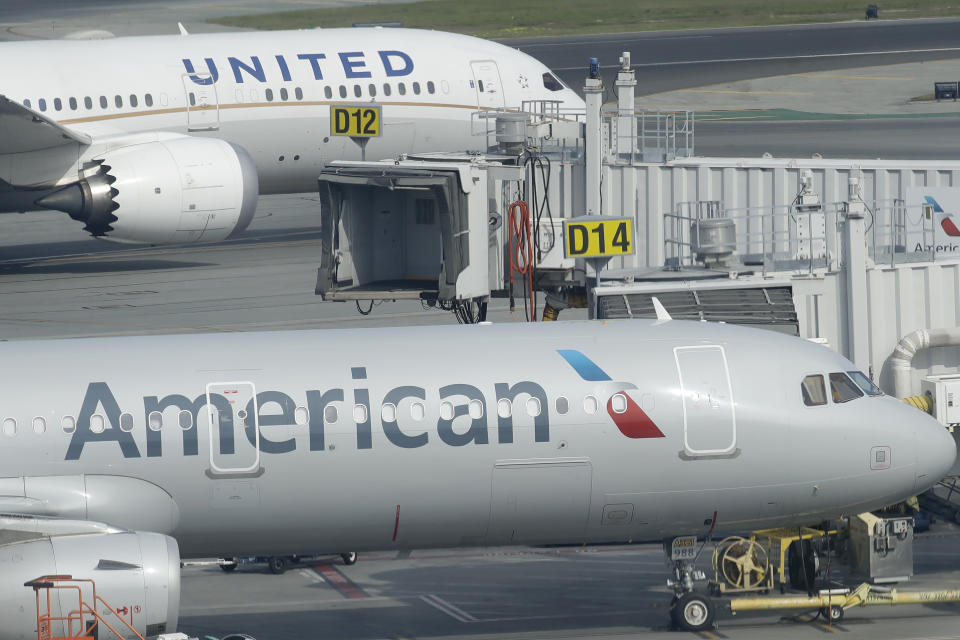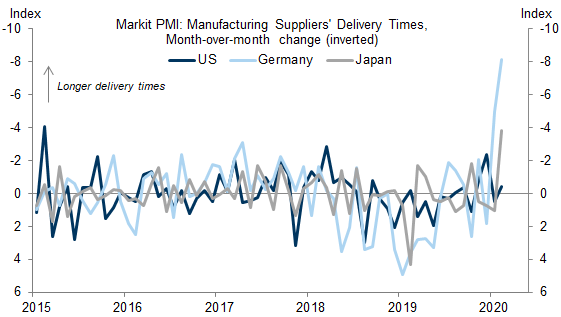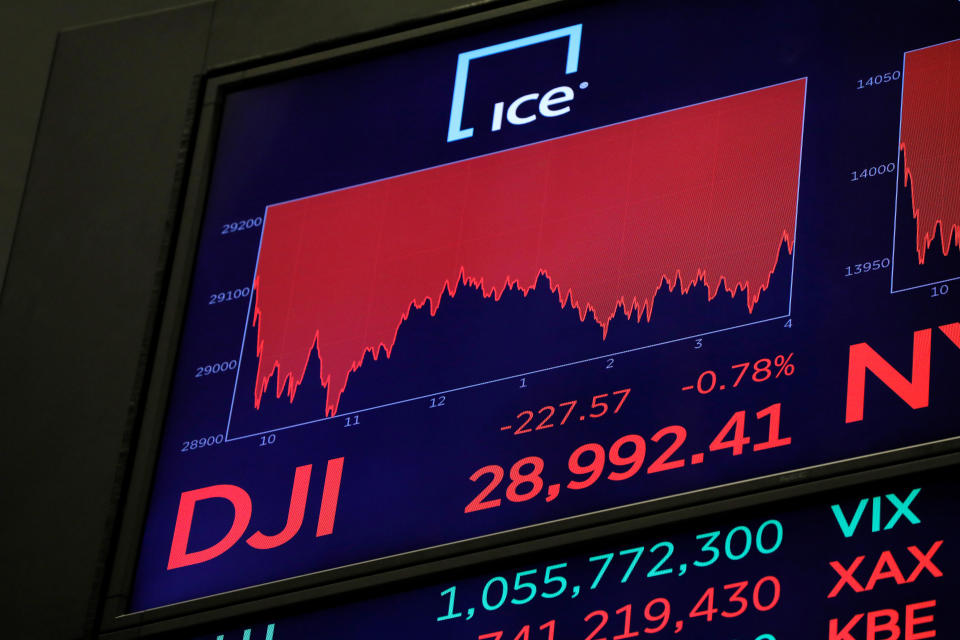Stock market news live: Wall Street dives on coronavirus panic, stocks have worst day in 2 years
World markets got slammed on Monday, with investors unnerved by rising coronavirus concerns. An unexpected surge in confirmed infections within Italy and South Korea — which now has the largest cluster of cases outside of China — raised the possibility that the mystery virus could be mutating into a pandemic.
—
4:15 p.m. ET: Shake Shack swoons after Q4 earnings

Shake Shack’s fourth quarter earnings report is leaving investors hungry for more. The burger chain lost 6 cents per share and reported big jumps in quarterly revenue on relatively light sales, but its stock tumbled sharply in post-market trading after it gave guidance below Wall Street estimates.
Shake Shack’s (SHAK) stock plunged by nearly 11% from Monday’s close at $73.57, but have rallied 24% since 2020 began.
—
4:00 p.m. ET: Stocks walloped by coronavirus outbreak
Wall Street suffered its worst losses in 2 years on Monday, as fears of a global coronavirus pandemic forced investors out of stocks and into safe-havens like the dollar, gold and Treasuries. All of the Dow’s (^DJI) gains for 2020 have evaporated amid the volatility, which is unlikely to abate after an eruption of new infections outside of China.
Here’s where markets settled at the close:
S&P 500 (^GSPC): -3.35%, or -111.86 points to 3,225.89
Dow (^DJI): -3.56%, or -1,031.40 points to 27,961.01
Nasdaq (^IXIC): -3.71%, or -355.31 points to 9,221.28
Crude oil (CL=F): -3.95% or -$2.11 to 51.27
Gold (GC=F): +0.73% or $12.00 to 1,660.80
3:23 p.m. ET: Key pharma stocks hit by opioid fears
Monday has been a bad day for pharma giants ensnared in opioid legal action. Mallinckrodt (MNK) crumbled by a whopping 40% at its lows, after a Wall Street Journal report that the company may be preparing for the bankruptcy of its U.S. generics unit, which is in the crosshairs of opioid lawsuits. Separately, Teva (TEVA) — another opioid maker — dropped by over 4%, in part because of a “sell” recommendation by Edward Jones.
—
1:15 p.m. ET: Pandemic jitters send Europe to its worst day in 3 years
European stocks suffered their worst day since 2016 on Monday as coronavirus infections climbed in Italy, the eurozone’s third-largest economy.
The pan-European STOXX 600 index (^STOXX) closed down by almost 3.8%, with stocks on Italy’s FTSE MIB Index (FTSEMIB.MI) sinking by more than 5.4%. The FTSE 100 (^FTSE) declined by more than 3.3% in London. Germany’s DAX (^GDAXI) was down by 4%, while France’s CAC 40 (^FCHI) was down by more than 3.9%.
__
Noon ET: Stocks take new leg lower; travel and leisure lead the rout

All of Wall Street’s major benchmarks are hunkered near session lows on coronavirus selling, with airlines and other leisure stocks bearing the brunt of selling. Some of the sector’s prominent names, like American Air (AAL), Norwegian Cruise (NCLH), Delta (DAL), Carnival (CCL), Royal Caribbean (RCL) and Booking.com, are off by at least 7% on the day. Travel and leisure has long been seen as most vulnerable to the pathogen (the Diamond Princess fiasco a prime illustration of why).
11:25 a.m. ET: Why Apple, tech stocks are sinking
For Apple (AAPL) and several other tech bellwethers, the heavy reliance on China (both from a demand and supply perspective) are an albatross as coronavirus fears crimp the global supply chain.
In a note to clients on Monday, D.A. Davidson cited the iPhone maker as the biggest loser in the current environment. Analyst Tom Forte told Yahoo Finance in an interview that Grubhub and Netflix could benefit, as homebound citizens order in and binge on television.
The firm also listed the following as having “significant risk”:
In late morning trading, Apple dived by 4% to trade around $300 per share, while Facebook slumped by nearly 5%.
11:00 a.m. ET: Stocks pull off troughs, still sharply lower
Wall Street has clawed off session lows, but indexes remain well underwater as traders aggressively price in a worsening of the coronavirus outbreak. Here’s where major benchmarks are currently:
S&P 500 (^GSPC): -2.69% or -89.92 points to 3,247.83
Dow (^DJI): -2.79%, or -808.98 points to 28,183.43
Nasdaq (^IXIC): -3.31% or -316.59 points to 9,260.00
Crude oil (CL=F): -4.40% to $51.03 a barrel
Gold (GC=F): +1.77% to $1,678 per ounce
—
10:50 a.m. ET: Italy, already reeling, takes new blow from virus outbreak
Via Reuters, Italy — a G7 economy that’s seen sluggish (if nonexistent) growth for much of the last decade, is all but certain to take another hit from the coronavirus’ appearance there. Over 220 people have been infected since Friday with six dead.
The euro zone's third-largest economy has been the most sluggish in the 19-nation bloc since the start of monetary union. It shrank by 9% in the wake of the 2008 global financial crisis and has recovered only about half of that since then.
Italian GDP fell by 0.3% in the fourth quarter of last year from the previous three months, yielding full-year growth of just 0.2%. Economists expected it to fare little better this year -- and that was before the coronavirus hit.
—
10:15 a.m. ET: WHO on coronavirus pandemic: ‘Not yet’
In its daily update, the World Health Organization’s director general made a distinction between the coronavirus being a contagious epidemic and a full-fledged pandemic:
"Our decision about whether to use the word “pandemic” to describe an epidemic is based on an ongoing assessment of the geographical spread of the virus, the severity of disease it causes and the impact it has on the whole of society.
"For the moment, we are not witnessing the uncontained global spread of this #coronavirus, and we are not witnessing large-scale severe disease or death. Does this virus have pandemic potential? Absolutely. Are we there yet? From our assessment not yet."
Meanwhile, The White House may seek up to $1 billion to prevent the virus from worsening in the United States.
—
10:14 a.m. ET: How the coronavirus will affect the global economy

Goldman Sachs took a knife to its U.S. estimates, shaving 0.2 percentage points off estimated Q1 GDP given the widening coronavirus outbreak. The bank warns that “risks are clearly skewed to the downside” in light of supply chain troubles, and will be felt in the following four ways:
The impact of the coronavirus on US growth is likely to come from four main channels, namely 1) reduced US goods exports to China, 2) reduced spending in the US by Chinese tourists and students, 3) a decline in US retailers’ services value added through lower US consumption of imported goods, and 4) a decline in US production due to supply chain production disruptions. The first two channels reduce output through lowering demand, while the latter two channels reduce output through a reduction in supply.
In a separate note, Goldman cited evidence that suggested the virus’s spread “is likely having a somewhat gradual but still sizeable impact on macro data.”
—
9:50 a.m. ET: Expect cheaper energy prices until 2025: BofA
The upside of the coronavirus crisis will be sharply lower energy prices, with the hit to global demand expected to keep crude depressed, according to Bank of America. In a research note to clients on Monday, analysts said they expect Brent to range-trade between $50 and $70 until 2025:
As prices become more anchored around $60, we believe volatility implied in oil options could trend lower in the medium term. In contrast to last year, we see more support to our price outlook on increased capital discipline across the US shale industry, despite coronavirus risks. Our projections assume OPEC+ is prepared to continue to lose share in the global oil market, particularly if pandemic risks rise again.
More broadly, we expect oil as a share of the global energy pie to will drop as well as the petroleum consumption mix keeps rotating away from gasoline and heavy ends into distillates and NGLs (natural gas liquids).
The bank also expects the oil market to need additional production cuts this year amid “modest” demand that will keep Brent averaging $62 per barrel in 2020.
—
9:30 a.m. ET: Wall Street plunges at the opening bell
The escalating coronavirus crisis is taking a huge toll on financial markets. The bloodletting that started on Sunday with stock futures and continued through Asia and European session has now hit U.S. blue-chip and tech stocks. Some of the day’s biggest losers include bellwether names like Apple, Google and Tesla — all of which fell by around 5% on the day.
Here’s where the markets began Monday’s trading session, which is shaping up to be an ugly one:
S&P 500 (^GSPC): -3% or -100 points to 3,237.52
Dow (^DJI): -3.2% or -918.19 points to 28,074.13
Nasdaq (^IXIC): -3.52% or -336.76 points to 9,245.73
Crude oil (CL=F): -4.72% to $50.86 a barrel
Gold (GC=F): +2.18% to $1,684.70 per ounce
Analysts, however, don’t think the current drop will last. Invesco’s Brian Levitt told Yahoo Finance on Monday that the current scare is little more than a blip in a longer secular bull that won’t trigger a recession. "We will be back sometime later in this year talking about stabilizing economic activity."
—
7:30 a.m. ET: Stock futures slump in early trading
U.S. stock futures appeared poised to extend last week’s losses, with each of the three major indices indicating a lower open as Wall Street grappled with the widening coronavirus crisis.
Here’s were the main moves during the pre-market session, as of 7:30 a.m. ET:
S&P 500 futures (ES=F): 3,265.00, down 74.25 points or 2.22%
Dow futures (YM=F): 28,293, down 688.00 points or 2.37%
Nasdaq futures (NQ=F): 9,222.25, down 235.75 points or 2.49%
Crude oil (CL=F): $51.39 per barrel, down $1.99 or 3.73%
Gold (GC=F): $1,682.50 per ounce, up $33.70 or 2.04%
An unexpected surge in confirmed infections within South Korea and Italy — which now has the largest cluster of cases outside of China — raised the possibility that the mystery virus could be mutating into a pandemic. Last week, the Hubei province at the epicenter of the coronavirus outbreak revised its method of counting cases for the third time this month, further undermining confidence in the country’s official counts.
It raises the stakes for the entire global economy rather than just China, where the overwhelming majority of the world’s nearly 80,000 cases are located. According to Marc Chandler at Bannockburn Global Forex:
The [coronavirus] has not only crippled the Chinese economy, but its sheer size and magnitude of its integration in the global supply chains have far-reaching knock-on effects. Asia-Pacific economies that were increasingly reliant on Chinese input and demand are the most vulnerable. Estimates suggest that the world's second-largest economy is operating well less than 50% of capacity.
Indeed, the extension of the stoppages and disruptions increase the likelihood that the Chinese economy contracts in Q1 [and] The supply chain disruptions are adversely impacting Japanese and Korean automakers. German automakers derived a substantial share of their profits from China, and car sales continue to weaken.
The virus is sending ripples across the global supply chain, with names like Volkswagen, Burberry, Starbucks and Apple among the growing list of multinationals whose operations are being adversely impacted by the outbreak.

—
Follow Yahoo Finance on Twitter, Facebook, Instagram, Flipboard, LinkedIn, and reddit.
Find live stock market quotes and the latest business and finance news

 Yahoo Finance
Yahoo Finance 